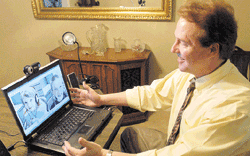Technology helps parents stay in contact with children
by ELIZABETH PIERSON HERNANDEZ/VALLEY MORNING STAR
KEEPING IN TOUCH - Texas House Bill 1864 allows judges in child-custody cases to order access between parent and child using wired or wireless technology, including phones, e-mail, instant messaging, teleconferencing or Web cameras. John Speer who lives in Palm Valley and is divorced, has set up a webcam on his laptop to communicate with two of his three children, Betsy Speer, 12, and Trevor Speer, 11, who live with their mother in Winfield, Illinois.
 John Speer is in his Palm Valley kitchen giving a cooking lesson to two of his kids, showing them just how easy it is to make Caprese Salad, an Italian dish he loved to eat when he lived in Chicago's Little Italy.
John Speer is in his Palm Valley kitchen giving a cooking lesson to two of his kids, showing them just how easy it is to make Caprese Salad, an Italian dish he loved to eat when he lived in Chicago's Little Italy.
He slices the tomatoes just so. He shows them the basil he's grown in his herb garden. Then he'll add the mozzarella cheese, olive oil, oregano and capers.
He is alone in his kitchen but he can see and hear Betsy, 12, and Trevor, 11, and they him, through the Web cameras they're using for weekly virtual visitations between the Rio Grande Valley and Illinois, where the children live.
Parents like Speer who don't have full custody of their children could increasingly be awarded virtual visitation in divorce cases because of a Texas law that became effective Sept 1st, 2007. Texas Family Code 153.015, Electronic Communication with Child by conservator.
The law says that judges can order electronic visits using any wired or wireless technology, including telephone, e-mail, Web cameras, instant messaging or videoconferencing.
The communication must not replace in-person visits, only supplement them.
Many judges already order phone and e-mail access between children and their out-of-the-home parent so they can talk about homework or say goodnight in between scheduled weekend and vacation visits.
But the idea of allowing visits by Web camera, e-mail, even telephones, was never spelled out in law, making it possible for judges to refuse to consider the possibility, said Rep. Veronica Gonzales, D-McAllen, author of the bill and an attorney who has practiced family law.
"A judge could just say, look it's not in the statute, it's not standard, it's outside my realm of my computer knowledge, we're not going to deal with it," Gonzales said. "But with it in the statute, the judge would have to acknowledge this as an option."
Texas becomes the third state, after Utah and Wisconsin, to legalize virtual visitation, Speer said. He worked to have the law passed with Sen. Eddie Lucio Jr., D-Brownsville, who then asked Gonzales to add it to one of her bills.
The law affects divorces settled in Texas courts. Speer's case was settled in Illinois and he worked out an agreement with his ex-wife to schedule the visits because it became too expensive for him to travel regularly to Illinois or fly his children to Texas, he said.
Speer, a media finance expert, moved back to the Valley to care for his ailing mother and connects weekly now with his children via the assistance of a webcam. Since the virtual visits began in August 2006, his relationship with his children has blossomed, he said. On the phone they responded to his questions with a series of grunts and one-word answers, as children are prone to do. With the camera, they come alive, he said.
Trevor has asked Speer to demonstrate how to use free weights so he can impress girls. Betsy is an avid reader and talks to him about books, he said.
"I'm no longer just a wallet at a distance," Speer said. "I'm now Dad. I'm at the table. I'm with them," he said.
It is dads who are most likely to benefit from the law since about 90 percent of non-custodial parents are men, said Norval Glenn, a professor of sociology at the University of Texas at Austin.
Too often, non-custodial parents pick up their children for a weekend and shower them with fun activities, which is kind, but does not resemble daily life, Glenn said. Regular communication improves relations, he said.
"This is how parents and children bond and how they establish a normal parent-child relationship, and if that's absent, it's more kind of like an uncle or aunt/niece or nephew interaction," Glenn said.
In cases where the parents do not work together for the best interest of the children, no amount of electronic communication can solve complex family problems, Glenn said.
In 2003, more than 84,000 divorces were declared in Texas, affecting 67,000 children, according to data from the Texas Department of State Health Services.
Veronica Farias, a family law attorney in Brownsville, said telephone visits and exchange of cell phone numbers are commonly agreed to in court, but she has never seen a judge order visits by Web camera. She plans to start asking for the visits, she said.
Even parents who live in the same county as their children and see them regularly would "be thrilled" to have more contact, she said.
"By the time you pick up your kids, take them to Luby's or Chuck E. Cheese's, it's so limited," she said. "Fifteen minutes for a little extra, 'how was your day?' or 'Did you get your report card?' and I think that would create a lot more unity."
The bill was meant to put a stop to cases where custodial parents block access the child has to the other parent, even though a judge has allowed the contact, said Sen. Juan "Chuy" Hinojosa, D-McAllen, who sponsored the bill in the Senate and has practiced family law.
"Many times parents who have custody were prohibiting their children from e-mailing with the other parent, or calling, and that's not right," Hinojosa said. "We have to protect that right."
Speer said he and his ex-wife had fought in the past about how much long-distance access he should have to his children. She didn't want the Web camera in the home, so he found a neutral site, a family center, near their Illinois home, equipped it with a Web camera, and she agreed to take the children there for their weekly visits.
He's trying to identify a neutral site in the Rio Grande Valley to equip with a Web camera so other families can make similar arrangements, he said.
Speer said the virtual visits could never replace hugs, but in his family they have re-introduced his children to him. Sessions like the salad lesson give them access to another parent's perspective, he said.
"It's one of the various things that Dad can offer something that maybe their mother is not offering," he said. "This is not in competition, but to augment what they're getting."
Read: Texas Family Code § 153.015 Electronic Communication With Child By Conservator




